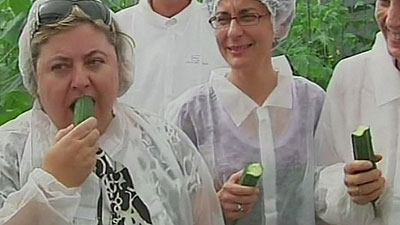Amy went to France the other day and I’ve got the 1973 classic, Come Monday by Jimmy Buffett running through my head (check the video below; now that’s a moustache).
 But Amy’s worried about cucumbers.
But Amy’s worried about cucumbers.
This is a photo of her airplane meal.
For a continent that prides itself on traceability and farmers’ markets, the response to the E. coli O104 outbreak, which has killed 17, stricken 470 with severe kidney disease and sickened some 1,500, has been woefully inadequate.
And now, 10 days after the outbreak emerged, the Germans say it wasn’t Spanish cucumbers in some sort of European revisionist history (they’re good at that).
Here are the top-5 dumb things about the E. coli O104 outbreak; at some point politics may take a back seat to public health; but this is Europe.
5. Don’t blame Spain
Yesterday, the Minister of Agriculture for Spain did what every politician does and fell on her sword by eating the suspected produce – killer cucumbers (left).
Spain’s agriculture minister Rosa Aguilar defended her country’s fresh produce and said it is still unclear exactly when and where the vegetables were contaminated.
She even tucked in to some cucumbers grown in Spain on Monday to show they cannot be blamed for one of the largest E. coli outbreaks in the world.
What no one has mentioned is the on-farm food safety steps that Spanish and other growers, distributors and retailers take to ensure microbial food safety. An outbreak this huge is an opportunity to brag – if procedures are in place. But maybe that’s why no one is bragging.
4. Terrible journalism
Why has no one tried to track down the source and looked at food safety procedures? The New York Times, 10 days into the crisis went with, Outbreak of Infections,  probably the worst headline ever. E. coli O104 is not herpes. Time magazine went with, don’t panic, but be concerned.
probably the worst headline ever. E. coli O104 is not herpes. Time magazine went with, don’t panic, but be concerned.
3. It’s a trade/money thing
Contrary to humanistic goodwill, most food safety trade issues have nothing to do with public health and everything to do with market access. That’s why Gerd Sonnleitner, the head of the German Farmers’ Association (DVB), called for stronger regulation of imported vegetables and said there has been unwarranted fearmongering about German vegetable products.
“We have very strict rules over the entire chain on controlling and accepting what we think is right,” Sonnleitner said. “Unfortunately imports are tested much more laxly.
So why isn’t Sonnleitner explaining all the things German farmers do to enhance on-farm food safety?
No need. They’ve decided to sue German health authority the Robert Koch Institute and the Federal Consumer Ministry for damages over warnings about eating vegetables made to the public in the wake of the E. coli bacteria outbreak.
2. It’s a small risk thing
More people die every day in car accidents than are likely to perish from the current E. coli outbreak. Yet we know every time we get behind the wheel of a car that we are taking a small risk. We don’t, on the other hand, expect to die from eating a cucumber.
The left-wing Berliner Zeitung was the strongest proponent of the latter case, arguing that 21st-century consumers were so geographically and psychologically disconnected from their food production that they had only themselves to blame.
The right-wing Berliner Morgenpost pointed out that swine flu resulted in a much higher death toll than that caused so far by E. coli. And swine flu, ultimately, was seen as media hype.
Even the small risk posed by the bacteria could be avoided by taking sensible hygiene precautions. And if a person does get sick, they can see their doctor right away.
Who writes this stuff?
1. It’s a women thing
At the beginning of the public phase of the outbreak, Gerard Krause of the Robert Koch health authority responsible for epidemiology, said,
“Women prepare food more often, and it is there they could have come into contact with it, possibly while cleaning vegetables or other foodstuffs.”
In a German version of blame-the-consumer, the Robert Koch Institute has recommended people improve kitchen hygiene, making sure in particular that cutting boards and knives are clean.
It’s doubtful that 1,500 women practiced lousy kitchen cleanliness at the same time across Germany.
